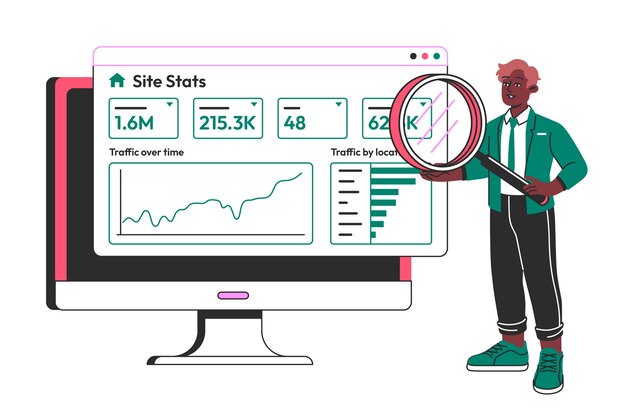Tracking keyword rankings is a vital part of any successful SEO strategy. It provides insights into how your website performs on search engine results pages (SERPs) and helps refine your content and marketing efforts. The SERP Keyword Tracker is a tool designed to make this process seamless and effective. This article explores everything you need to know about SERP keyword tracking, its benefits, features, and how to use it for optimal results.
What is a SERP Keyword Tracker?
A SERP keyword tracker is a tool that monitors the position of specific keywords on search engines like Google, Bing, and Yahoo. It shows how your website ranks for targeted keywords and provides valuable data to assess the effectiveness of your SEO efforts.
Whether you’re managing a personal blog or a large e-commerce platform, understanding your keyword performance is critical. A SERP keyword tracker automates the process, giving you real-time updates and insights without manual searches.
Why is Tracking SERP Keywords Important?
1. Measure SEO Success
Tracking your keywords helps you evaluate the success of your SEO strategy. You can see which keywords are driving traffic and identify areas that need improvement.
2. Identify Trends
SERP rankings often fluctuate due to changes in algorithms, competition, or seasonal trends. A keyword tracker lets you spot these changes early, allowing you to adapt your strategy accordingly.
3. Stay Ahead of Competitors
Understanding where your competitors rank for shared keywords gives you an edge. You can analyze their strategies and work to outperform them.
4. Improve Content Strategy
By identifying high-performing and underperforming keywords, you can create content that aligns better with your audience’s search intent.
Features of a Reliable SERP Keyword Tracker
A good SERP keyword tracker should offer the following features to help you monitor your SEO performance effectively:
1. Accurate Rank Tracking
Accuracy is non-negotiable. A top-tier tracker provides precise ranking data for all your keywords, updated regularly to reflect changes in real-time.
2. Global and Local Tracking
If your audience spans different regions, the ability to track keywords globally or locally is essential. This feature ensures you understand how your website performs in various markets.
3. Competitor Analysis
The best trackers allow you to compare your rankings against competitors. This helps you identify opportunities to outrank them in SERPs.
4. Device-Based Tracking
With the rise of mobile browsing, it’s important to track rankings on both desktop and mobile devices. A tracker that separates these insights is invaluable.
5. Keyword Grouping
Managing large lists of keywords can be overwhelming. Grouping similar keywords makes it easier to analyze data and refine strategies.
6. Performance Reports
Detailed reports allow you to share insights with stakeholders or team members. Look for a tracker that offers customizable, easy-to-read reports.
How to Use a SERP Keyword Tracker
1. Set Up Your Keywords
Start by identifying the keywords you want to track. Focus on terms that align with your content, products, or services. Include a mix of long-tail and short-tail keywords for broader insights.
2. Define Your Goals
What do you hope to achieve by tracking keywords? Whether it’s increasing organic traffic or improving conversion rates, having clear goals ensures you interpret the data effectively.
3. Monitor Regularly
Rankings can change frequently, so regular monitoring is key. Set up alerts for significant shifts in keyword positions to stay informed.
4. Analyze Competitor Rankings
Use your tracker to analyze how your rankings compare with competitors. Identify keywords where they outperform you and refine your strategy to bridge the gap.
5. Adjust Your Strategy
Use the insights from your tracker to optimize content, improve on-page SEO, and build backlinks. A continuous improvement approach ensures long-term success.

Benefits of Using a SERP Keyword Tracker
1. Save Time
Manually checking keyword rankings is time-consuming. A tracker automates the process, freeing up your time for other tasks.
2. Improve ROI
By focusing on high-performing keywords, you can direct resources toward strategies that yield the best results.
3. Boost Content Relevance
Keyword data helps you create content that resonates with your audience, improving engagement and search visibility.
4. Track Progress Over Time
A tracker provides historical data, enabling you to see how your rankings have improved (or declined) over weeks, months, or years.
Choosing the Right SERP Keyword Tracker
There are many keyword tracking tools available, each with unique features. Many widely favored options are available to explore:
1. SEMrush
SEMrush offers comprehensive keyword tracking alongside competitor analysis and content optimization tools.
2. Ahrefs
Known for its powerful backlink analysis, Ahrefs also provides accurate keyword tracking and in-depth reports.
3. Google Search Console
This free tool from Google gives insights into your website’s search performance, including keyword rankings.
4. SERPWatcher by Mangools
SERPWatcher is user-friendly and ideal for small businesses or individuals. It focuses on simplicity without sacrificing accuracy.
5. Rank Tracker by SEO PowerSuite
This tool allows for unlimited keyword tracking and integrates with multiple search engines.
When choosing a tracker, consider your budget, required features, and ease of use.
Common Challenges in Keyword Tracking
1. Ranking Fluctuations
It’s normal for rankings to fluctuate, especially for new keywords. Focus on identifying broader trends over time instead of daily fluctuations.
2. Data Overload
Too much data can be overwhelming. Use filters and reports to focus on what matters most to your goals.
3. Algorithm Updates
Search engines frequently update their algorithms, impacting rankings. Keep up with changes in search algorithms to refine your strategy effectively.
Tips for Optimizing Your Keyword Strategy
- Focus on Search Intent: Ensure your keywords align with what users are looking for.
- Use LSI Keywords: Include related terms to improve content relevance and ranking potential.
- Build Quality Backlinks: Backlinks from reputable sites can boost rankings for tracked keywords.
- Optimize for Mobile: With more users searching on mobile devices, ensure your site is mobile-friendly.
Conclusion
A SERP keyword tracker is an essential tool for anyone serious about SEO. It simplifies the process of monitoring rankings, provides actionable insights, and helps refine your strategy for better results.
Whether you’re a beginner or a seasoned SEO professional, investing in a reliable keyword tracker can take your efforts to the next level. By understanding and adapting to keyword performance, you can stay ahead in the competitive world of search engine optimization.
Start using a SERP keyword tracker today and see how it transforms your SEO strategy!
